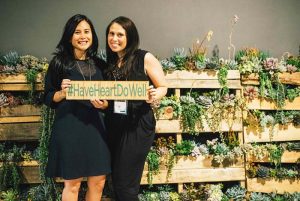
Source: Paper Ban Photography
Held on February 16-17, 2017 at Playa Studios, Culver City, the third annual Heart Series Conference gathered an incredible lineup of socially and environmentally conscious companies and individuals, for an important conversation about bettering the world for the good of humanity. Its Co-Creators Meg Sette and Gail Cayetano, both passionate about making a great social impact, founded the two-day conference with the vision of encouraging collaboration and fostering a sense of community between conscious companies.
This year, the Heart Series partnered with over 40 sustainable brands, including Suja Juice, Yuni, Mamma Chia, Yoga Works, and fabfitfun, and featured 27 speakers from across the industries. Here are our key takeaways from day one of the conference.
10 Trends in 10 Minutes: The Latest for Humanity
Melissa Lavigne-Delville is the founder of Culture Co-Op, an agency that conducts ethnographic research, trend analysis, and quantitative studies on the attitudes, behaviors, and trends surrounding Generations X, Y, and Z.
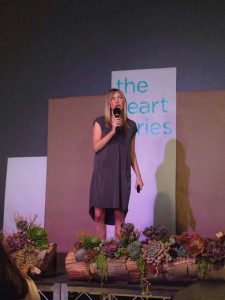
Photo Credit: Chloe Liu
Having studied these generations for years, she presented her research on the 10 biggest trends that are changing culture now. “Plated Politics,” she pointed out, are one of the emerging trends, as we see an increasingly interwoven relationship between food and politics. Other trends include Sustainable Pricing, Startup Cities, and Scratch Activism.
The most seismic trend, however, is Generation Z as digital natives. Melissa noted that Gen Z, who are youngsters born between 1995-2005, “are as native to the digital as they are nostalgic to a time without it… they are much less receptive to top-down authority; they want to make up their own mind.” She found that this generation is shockingly positive about the world, despite being born into and raised in a cultural backdrop of wave after wave of horrible news. Gen Z believes they can make a positive impact in the world, and choose to see the glass as half full.
Aligning Passion + Good For Global Impact
Three years ago, Ann Wang, Founder and CEO of Enrou, had one belief: that creative and passionate people can radically change the world for the better. Wanting to drive change and sustainability by creating jobs, she sought restlessly to create a marketplace that aggregates conscious companies and social enterprises focused on developing the human capacity, at the same time creating amazing products. Today, not only has she been named 2016 Forbes 30 Under 30, but has created one of the most inspiring e-commerce stores out there. As of now, Enrou has supported 47 communities and employed over 7,700 people, many of whom are women in Uganda who have been impacted by the war or abducted from their homes. Ann said, “Every product at Enrou creates hours of dignified work.” Every purchase made empower the artisan who made the product with dignified work, an income, and job training.
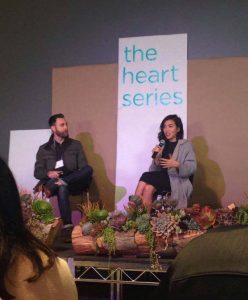
Photo Credit: Chloe Liu
On what advice she would give to social entrepreneurs, she said, “understand the ‘why’ of who you are speaking to, and what motivates your investors, suppliers, and audience to do what they do.” Think about how you can inspire your customers to do good, and how you can drive their personal growth and motivation. Enrou tells emotional and inspiring stories about the people whose lives it has changed through authentic sales and dignified work. Through these powerful stories, it hopes to inspire others to do good and discover a life of meaning.
Reinventing the Game: Establishing Meaningful Business Relationships
While having passion and drive is fundamental to creating far-reaching and lasting social impact, one cannot overlook the importance of partnerships. Moderated by Justin Wolff, Chief Giving Officer at Yoobi, this panel featured Monika Wiela, CEO of Give Back Box, Francis Aquino, Workplace Experience at Headspace, and Danielle Silber, Corporate Alliances, International Rescue Committee (“IRC”).
When the IRC was first founded at the request of Albert Einstein, Danielle shared, it had very little brand recognition. It needed to build an ecosystem of system in order to help people whose lives
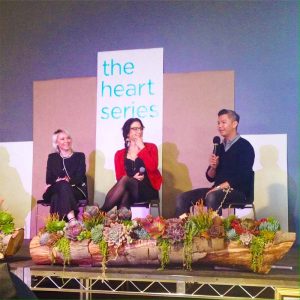
Photo Credit: Chloe Liu
have been shattered by conflict and disaster. How, then, were they able to forge vital relationships with local governments and make meaningful alliances? Danielle said, “We cannot overlook the importance of individual, authentic relationships… [the solution is to] find companies in the same space, with shared values, that seek to make the same sustainable impacts as you.” And with its partner organizations, one of them being HBO’s “Game of Thrones,” the IRC has helped more than 24 million people gain access to primary health care, gave 3.8 million people access to clean drinking water, provided education opportunities to more than 1.5 million children, and much more.
Creating Diverse and Inclusive Culture
What does workplace diversity mean to you? Madeline Di Nonno, Executive Director at Geena Davis Institute (“GDI”), described it as “not just a social imperative; it is a business imperative.” Abby Maldonado, Diversity and Inclusion at Pinterest, agreed and added, “It is about bringing under-represented groups of people into the company.” She continued, “It is not to be confused with inclusion, which has to do with creating a sense of belonging once these under-represented groups of people are in the company.” And why is this so important? Research has shown time and again that diverse teams outperform homogenous teams, because individuals in diverse teams anticipate their team members to have a different point of view, therefore are more prepared to accept a view different from their own. To ensure that diversity is a priority in the workplace, Abby suggested, “It is important to have a structured conversation, led by people who are knowledgeable about it, so that the conversation is productive instead of destructive.”
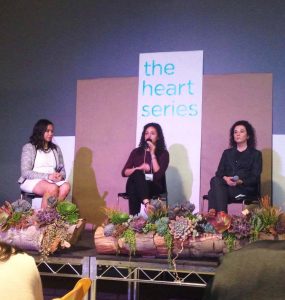
Photo Credit: Chloe Liu
Making Your Message Go Viral Around the World
From the ALS Ice Bucket Challenge to the Old Spice commercial, viral messages appear on our social news feed, or are sent to us by friends and family on almost a daily basis.
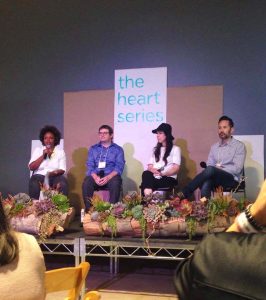
Photo Credit: Chloe Liu
It seems like more and more companies and individuals are succeeding in getting their message across to millions of people. How were they able to gain such explosive exposure? Unsurprisingly, “There is no real formula for virality. It depends on the company,” shared Adam Mordecai, Editor-at-Large at Upworthy. Likewise, Jaclyn Lindsey, Founder of Kindess.org. said, “Virality is circumstantial. The key is to have a mission that resonates with your audience. Tell stories that are true to the heart, real, relatable, and that honor your core values.” Instead of promoting your product or service, tell a good story – make it authentic and human. When the message is emotional and relatable, the audience can empathize with it, and see themselves as the hero in these stories. Jason Djang, Education Manager at YouTube, emphasized that “First and foremost, virality is not a relationship. Here at YouTube we are more concerned about content that creates relationship between the audience and creator.” He advised companies to think about their target audience, and give them a reason to share the content. And even if you don’t have a story, it is not the end of the world – you can still provide value and be of use to the audience through an education or instructional message.
The Triple Bottom Line
In a society that is so unforgiving – there are as many as 4,600 legal barriers for ex-convicts to re-enter society – it is extremely difficult for those who have successfully exited California’s correctional system to find legal living. Kabira Stokes, CEO of Isidore / Homeboy Recycling, has witnessed this firsthand and made it her mission to create employment opportunities for people coming out of prison, at the same time make electronic recycling safe, accessible, and easy. She dreams of one day, when both our human and natural resources are valued, not wasted. She said, “There is no room for a modern business to be anything but socially and environmentally responsible.” As of now, Isidore has offered employment to 27 ex-convicts, and with its recent acquisition by Homeboy Recycling, it will have an even bigger capacity to recycle e-waste as well as help those who have served their time and are ready to contribute to society.
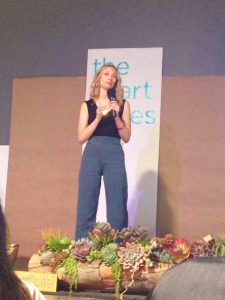
Photo Credit: Chloe Liu
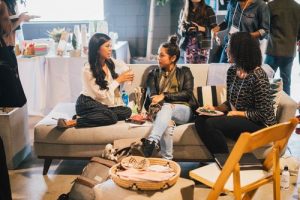
Source: Paper Ban Photography
